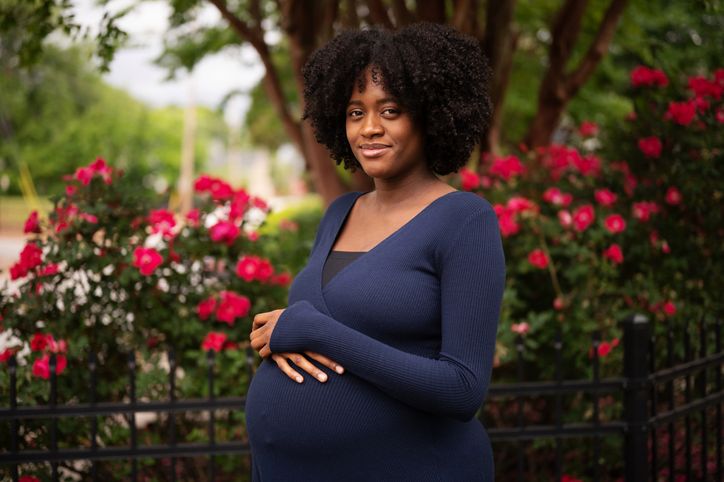‘Claiming Our Power, Resilience and Liberation’: The 4th Annual National Black Maternal Health Week

Source: Mindful Media / Getty
Black Maternal Health Week (BMHW21) will takes place every year from April 11-17, aimed at disseminating information and uplifting the voices of Black mother’s who have suffered disproportionately due to systemic racism.
In America, Black women are 2-3 times more likely to die from pregnancy-related complications than their white peers. The threat of complications, or even death, persists for Black mother’s regardless of class or education.
The week of observation was created by the Black Mamas Matter Alliance, a Black women-led cross-sectoral alliance, which centers Black mother’s in order to heighten awareness around We center Black mamas to advocate, drive research, build power, and shift culture for Black maternal health, rights, and justice.
“We’re not biologically different; there’s no Black gene or Black heart or Black kidneys,” explains Dr. Joia Crear-Perry, President and Founder of the National Birth Equity Collaborative (NBEC), who also serves on the advisory board of the Black Mamas Matter Alliance. “We’ve spent generations blaming Black people for their outcomes without really addressing the underlying root causes of racism, classism and gender oppression. So, when people ask me what is the cause for Black maternal death, the answer is not race. It’s racism.”
“We created Black Maternal Health Week to bring awareness to the Black Maternal Health crisis
but to also showcase the work of Black women-led organizations, practitioners, and leaders doing
the work in their own communities to support Black Mamas and their families who face
discrimination and mistreatment in care,” said Angela Doyinsola Aina, Co-Founder and Executive
Director of the Black Mamas Matter Alliance.
This year iOne Digital will serve as BMHW21’s digital partner and will host a series of virtual discussions featuring panelists including: Rep. Lauren Underwood (IL-14), Rep. Alma Adams (NC-12) and Sen. Cory Booker (D-NJ); Deputy Editor of Hello Beautiful Shamika Sanders, movement journalist and NewsOne contributor Anoa Changa; educator and sexologist Dr. Bianca I. Laureano; model and actress Denise Vasi; CEO of Expectful.com Nathalie Walton; Dr. Alisha Liggett. Other guests include representatives from ally organizations such as the Tara Health Foundation, the Commonwealth Fund, and the Institute of Women’s Studies (IWES).
“We are thrilled to partner with NBEC for Black Maternal Health Week,” said iOne Digital’s Senior
VP of Content Allison McGevna-Cirino. “Black women remain as unprotected and underserved as
ever, even as we are the very lifeblood of this country’s infrastructure. It is precisely why we are
committed to amplifying the organizations making a positive impact in our communities.”
“From the criminal legal system, to medical apartheid, reproductive injustices, and state violence,
systemic oppression has been mapped across the bodies of Black women since this nation’s
inception,” added iOne Digital Senior Director of Content Kirsten West Savali. “It is critical that Black mothers and Black birthing people are supported, protected, empowered, and cared for with
respect. The National Birth Equity Collaborative has been at the forefront of making that world
possible and iOne is honored to partner with them for Black Maternal Health Week.”
Visit birthequity.org/bmhw2021 for the full listings of NBEC’s BMHW21 programming, partnership
and sponsorship opportunities.
SEE ALSO:
App Focused On Black Maternal Health Receives $200K Grant
The Role Racism Plays In Maternal Health Is Having A Disastrous Effect On Black Mothers
[ione_media_gallery id=”4080089″ overlay=”true”]

